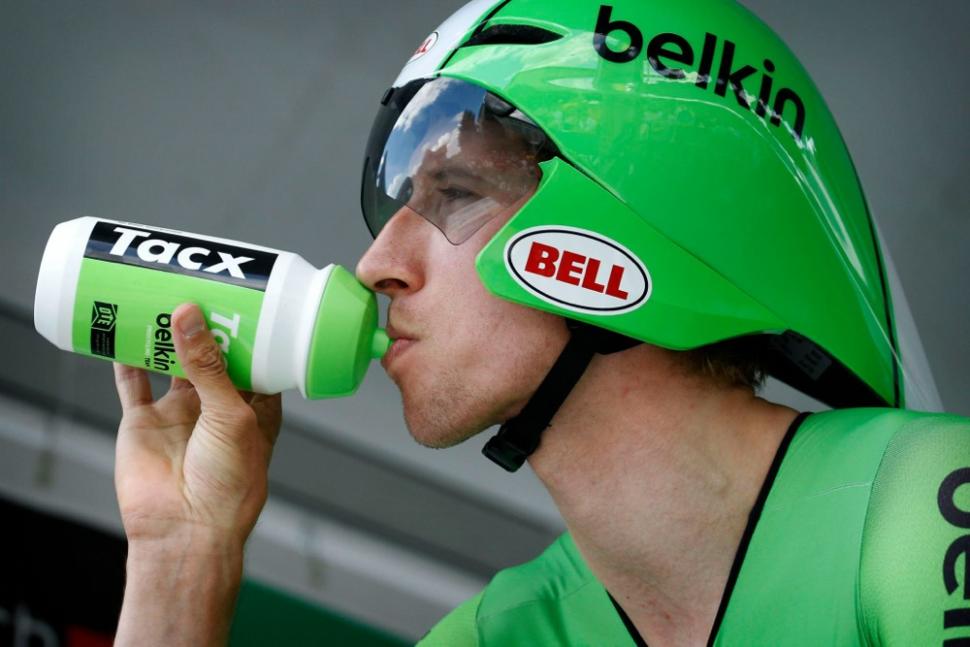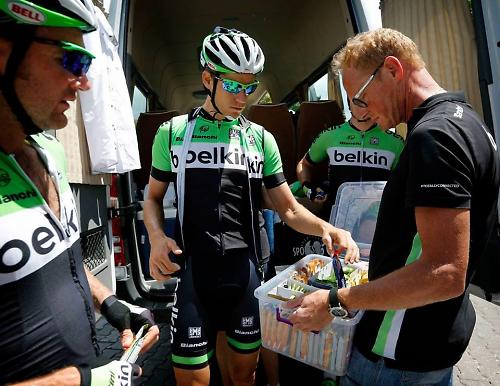- News
- Reviews
- Bikes
- Components
- Bar tape & grips
- Bottom brackets
- Brake & gear cables
- Brake & STI levers
- Brake pads & spares
- Brakes
- Cassettes & freewheels
- Chains
- Chainsets & chainrings
- Derailleurs - front
- Derailleurs - rear
- Forks
- Gear levers & shifters
- Groupsets
- Handlebars & extensions
- Headsets
- Hubs
- Inner tubes
- Pedals
- Quick releases & skewers
- Saddles
- Seatposts
- Stems
- Wheels
- Tyres
- Tubeless valves
- Accessories
- Accessories - misc
- Computer mounts
- Bags
- Bar ends
- Bike bags & cases
- Bottle cages
- Bottles
- Cameras
- Car racks
- Child seats
- Computers
- Glasses
- GPS units
- Helmets
- Lights - front
- Lights - rear
- Lights - sets
- Locks
- Mirrors
- Mudguards
- Racks
- Pumps & CO2 inflators
- Puncture kits
- Reflectives
- Smart watches
- Stands and racks
- Trailers
- Clothing
- Health, fitness and nutrition
- Tools and workshop
- Miscellaneous
- Buyers Guides
- Features
- Forum
- Recommends
- Podcast
feature
 ote bottle belkin tour 2
ote bottle belkin tour 2The nutrition of a Tour de France rider

The Tour de France is one of the hardest and most challenging endurance events in the world. You only have to glance at the stats above to get an idea of the lengths the riders have to go through just to finish. Nutrition plays a key role in the success of a rider’s race for the following reasons:
• Allows riders to maintain their level of performance for the three week race
• Promotes recovery
• Prevents weight loss, especially lean tissue mass as riders do not want to lose muscle
• Helps to maintain health and wellbeing
Many teams now work with a performance nutritionist and have their own team chef who travels with them. This ensures the food being prepared and consumed by the riders meets the above requirements, with the focus always on quality not necessarily quantity. The team chefs need to make sure the food is nutritious and varied, to avoid meal fatigue during the three-week race.

The recommended daily calorie intake for the riders ranges from 4,000kcal to 9,000kcal, while fluid intake can be as high as 10 litres. Typical daily carbohydrate needs vary from 500g to 700g, with approximately two-thirds of this being consumed after the race. Rider variation, weather conditions, terrain and altitude all play an important role in determining rider’s nutritional requirements. No two riders will have the same nutritional requirements.
Typical day at the Tour de France
On waking Riders often consume a juice drink. This helps to kickstart hydration for the day, and provides them with a host of nutrients and energy, without the bulk of eating large amounts.
Breakfast This isn’t much different to what you probably eat before a ride; porridge, eggs, yogurt, bread, jam will all be found at the breakfast table. There will, however, also be rice and pasta options. Probiotic drinks are also used to aid immune function, as the rider’s body will naturally be under a lot of stress.
On the way to the start Transfers from hotels to the start of the race are often long, plus stages in the Tour de France tend not to start until around midday. It is therefore important the riders remember to eat during this time. On the team buses riders will be able to get energy bars, flapjacks or bottles of energy drink/ electrolyte drinks.
During the race For the first two-thirds of most stages, unless involved in a breakaway, riders tend to eat solids and then, as the intensity increases, the riders turn to using the technical nutritional products such as gels. In terms of solid food, riders will start the stage with food and gels in their pockets and pick up additional supplies and bottles from the team car as they go. Alternatively, they can pick up a musette from a team assistant en route at the designated feeds that will include energy bars, energy gels, small sandwiches, homemade rice cakes and sometimes even small pieces of cake. The gels consumed will be both normal energy gels and caffeinated ones. Riders also need to remember to stay hydrated and will consume energy/ electrolyte drinks. As a guide, riders are encouraged to consume 2-3 pieces of race food (energy drink included) per hour and then an extra 500ml of water each hour.

Post-race As soon as the riders get back on the team bus it is essential that the recovery process begins. Recovery shakes are provided along with food such as cooked rice, boiled potatoes and tuna. Getting a 20-25g intake of protein kickstarts protein resynthesis. However, it is the co-ingestion with carbohydrates that has been found to optimize a rider’s recovery.
Evening meal This will change every night so riders do not become bored thus minimising barriers to refuelling. Each meal will typically start with a salad, the main course will consist of meat plus a serving of carbohydrate (rice, pasta or potatoes) and some vegetables. Riders will often have a fruit yogurt or fruit flan for dessert.
Before bed Cereal and milk, yogurt and honey or protein shakes are often consumed before riders go to bed. Sleep has been found to be an extension of the ‘window of opportunity’ for recovery where muscle adaption and repair can take place. Therefore, having a 20-25g intake of protein before bed can be crucial to optimise recovery, especially after a long, hard day in the saddle with more to follow.
For more information, or should you have any specific questions, please contact the OTE team: email thebunker [at] otesports.co.uk or check our blogs.
You can also read about OTE's experiences when the Tour came to Yorkshire.
OTE Sports are the Official Sports Nutrition Partner to Belkin Pro Cycling Team.
Latest Comments
- mitsky 35 min 52 sec ago
Is it any wonder that drink driving is still a problem when the police do nothing even with clear evidence like this: https://youtu.be/hw071PAofHQ
- Rendel Harris 42 min 22 sec ago
Such as, for example, saying: "It’s made from two types of fabric: super-loud yellow (orange is also available as a colour option, as is pink in...
- Mr Blackbird 47 min 22 sec ago
Possibly, but I think there will still be a time delay between receiving a warning and looking and the brain processing the image.I guess cycling...
- chrisonabike 2 hours 21 min ago
Indeed - but again these are perhaps questions we should keep asking. Even if the immediate answer is "well we are where we are" or "how on earth...
- Surreyrider 3 hours 15 min ago
Specialized aren't that American. Merida owns something like 49%.
- wtjs 4 hours 9 min ago
Then smash bad driving behaviour very hard...
- David9694 8 hours 46 min ago
Calls for Oxfordshire transport chief to resign blocked...
Add new comment
8 comments
700g of carbs?
Doesn't read right to me. That's about 2800cal or about a third of predicted total energy intake. Leaving the rest to come from fat and protein. Not likely given how those macronutrients affect digestion (for the vast majority anyway, there are always outliers than can almost go to Ketogenic levels of fat intake and still perform).
I suspect that the big mountains demand those higher energy intakes and I'd be surprised if carb intake on those days didn't reach even higher percentages than less energetically demanding days, given that the riders will be eating more on the bike those days, combined with the ease of eating carb-heavy foods. Although, having done 10hr plus rides, I'd not welcome the state of the toilet later that day...(
Seems to me they just race burn off the calories eating all that food is the real tough part!
eating all that food is the real tough part!
Drinking all that fluid...when do they go to the bathroom?
It sounds ideal to have a licence to consume, but from my much lower level experience of stage-racing (and only 3-4 days) it's actually a real pain.
Eating becomes a chore. You can't stop because if you do you'll never be properly refueled or you'll miss some window when you're supposed to have carbs/protein or whatever.
All the time you're just shovelling away - there is really very little space for enjoyment. By the end of it I'm just desperate to have a bowl of soup and some toast.
What about their teeth
The above mentions meat/fish quite a lot. IIRC the Linda McCartney team used to eat veggie/vegan stuff only. Also the IAMs team seems to have quite sleek coats - what do they eat?
What about but eating right before you go to bed? At this rate popping downstairs for a bowl of cereal at 1am can be seen as training nutrition.
Haha, changing dinner menus to stop "meal fatigue".
After riding like that I couldn't give two hoots what was dished up and put under my nose, I'm eating it. And a plate of seconds. And be grateful I'm not expected to do the dishes.
Hmmm, this looks like an ordinary day's intake to me. Perhaps that's why my body fat so stubbornly refuses to reach 5%.